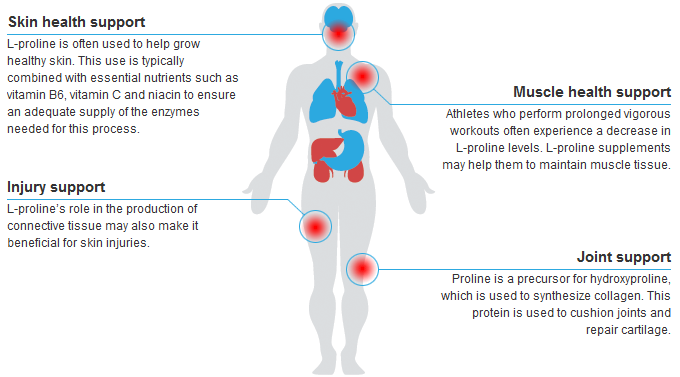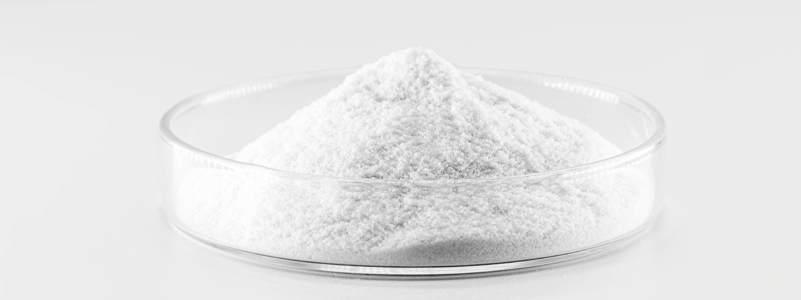L-proline is a proteinogenic amino acid crucial for collagen synthesis that supports skin elasticity and healing, joint cushioning through cartilage repair, muscle preservation in endurance athletes, and connective tissue recovery from injuries, addressing deficiencies caused by poor diets, chronic illness, or excessive physical exertion.
L-proline is one of the 20 amino acids that are used to synthesize proteins by the human body. This amino acid is encoded in the human genetic code with the codons CCA, CCC, CCG and CCU. L-proline is the only proteinogenic amino acid that is a secondary amine, meaning that its amine nitrogen is bound to two alkyl groups. Virtually all of the proteins in the human body contain L-proline, and the only amino acids that are more abundant are alanine and glutamine. L-proline is especially important in the production of collagen, which is a primary component in skin, cartilage and bone.
The biosynthesis of L-proline uses the amino acid L-glutamate as a precursor, along with the enzymes glutamate 5-kinase and glutamate-5-semialdehyde dehydrogenase. The German chemist Richard Willstatter first synthesized proline in the laboratory in 1900 by reacting 1,3-dibromopropane with the sodium salt of diethyl malonate. The German chemist Hermann Emil Fischer isolated proline from casein in 1901 by using gamma-phthalimido-propylmalonic ester.
The biochemical actions of pure L-proline include weak agonism of the glycine receptors and some glutamate receptors. Plants also use proline to generate tissues such as pollen. Health supplements containing L-proline are often taken to support the growth of connective tissue.
The support of joint and skin health is one of the most significant reasons for taking L-proline supplements. It may also support muscle growth and injury recovery.
L-proline is often used to help grow healthy skin. This use is typically combined with essential nutrients such as vitamin B6, vitamin C and niacin to ensure an adequate supply of the enzymes needed for this process.
L-proline’s role in the production of connective tissue may also make it beneficial for skin injuries.
Athletes who perform prolonged vigorous workouts often experience a decrease in L-proline levels. L-proline supplements may help them to maintain muscle tissue.
Proline is a precursor for hydroxyproline, which is used to synthesize collagen. This protein is used to cushion joints and repair cartilage.

Some conditions such as a low-protein diet, chronic injuries and illnesses may prevent you from manufacturing adequate quantities of L-proline. Endurance athletes may also benefit from L-proline supplements, especially long-distance runners. Specific signs in the skin that can indicate a deficiency of L-proline include wrinkles and sores that are slow to heal. Chronic joint discomfort due to degenerating cartilage is also a sign that you could benefit from L-proline.
L proline, proline
Shipping calculated at checkout
